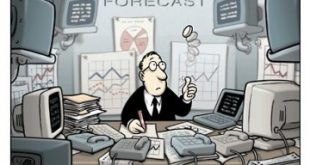from Lars Syll If bonus or “incentive pay” schemes work so well for senior executives and bankers, why does everyone not get them? The conventional answer is that a bonus scheme or incentive plan will indeed encourage the recipients to make more money for the shareholders or clients on whose behalf they act … A classic paper on the “principal-agent problem” … by Bengt Holmstrom and Paul Milgrom pointed out that the conventional answer makes the mistake of assuming that jobs are simple and...
Read More »Beyond market vs. state
from David Ruccio At one time, from the late-1970s until the last couple of years, Britain—or at least the British ruling class—was in love with neoliberalism. Neoliberalism was the common sense of both major political parties—the Tories and Labor (plus, the Conservative coalition partner Liberal Democrats)—as well as most large corporations and wealthy individuals. As Andy Beckett explains, In the early years of the 21st century, the inevitability of an ever more competitive,...
Read More »An international financial architecture system to deal with persistent trade imbalances and any international financial crisis
from Paul Davidson An international financial architecture system to deal with persistent trade imbalances and any international financial crisis can be developed to operate under the same economic principles laid down by Keynes at Bretton Woods. But this system does not require the establishment of a supranational central bank of the world as Keynes suggested in his “Keynes Plan” at Bretton Woods. Instead, this new international payment system is aimed at obtaining a more acceptable...
Read More »France’s malaise doesn’t keep it from employing a larger share of prime-age workers than U.S.
from Dean Baker It’s standard practice in news stories to refer to France’s economy as a basket case. The NYT went this route in an article on President Emmanuel Macron’s efforts to rewrite the country’s labor laws. The article refers to Macron’s efforts to “revitalize” the French economy and then tells readers: “The code is regarded by many as the wellspring of the country’s malaise and the chief obstacle to generating jobs, leaving the country with an unemployment rate that...
Read More »How rigged markets make the rich richer
from Lars Syll Markets are never just given. Neither God nor nature hands us a worked-out set of rules determining the way property relations are defined, contracts are enforced, or macroeconomic policy is implemented. These matters are determined by policy choices. The elites have written these rules to redistribute income upward. Needless to say, they are not eager to have the rules rewritten — which means they also have no interest in even having them discussed. But for progressive...
Read More »Disappearance of borrowers finally recognized after 2008
from Richard Koo Until 2008, the economics profession considered this kind of contractionary equilibrium (the world of $500) brought about by a lack of borrowers to be an exceptionally rare occurrence—the only recent example was the Great Depression, which was triggered by the stock market crash in October 1929 and during which the US lost 46 percent of nominal GNP in the process described above. Although Japan fell into a similar predicament when its real estate bubble burst in 1990, its...
Read More »Lost decade?
from David Ruccio Narayana Kocherlakota, professor of economics at the University of Rochester and past president of the Federal Reserve Bank of Minneapolis, is right: in some ways, the 2007-08 was worse than the Great Depression. It certainly has been worse for average households in the United States. Real median household income (the red line in the chart above) is still below what it was in 2007—and lower still from what it was even earlier, in 1999. But it hasn’t been a lost decade...
Read More »The conundrum of unknown unknowns
from Lars Syll Short-term weather forecasting is possible because most of the factors that determine tomorrow’s weather are, in a sense, already there … But when you look further ahead you encounter the intractable problem that, in non-linear systems, small changes in initial conditions can lead to cumulatively larger and larger changes in outcomes over time. In these circumstances imperfect knowledge may be no more useful than no knowledge at all. Much the same is true in economics and...
Read More »Progressive mobilization in Europe
from Jayati Ghosh Meetings of global leaders – such as recently occurred in the G20 meeting at Hamburg – increasingly have a ring of farce about them. The inability to come to agreement on pretty much anything of significance is leavened only by sideshows and media obsession with which global leader met with whom for how long, who sat in for which President at the “high table”, and similar trivia. Meanwhile, there is abject failure on the part of these leaders to recognize the pressing...
Read More »Dustbin of history?
from David Ruccio Back in April, Raumplan and Cascina Cuccagna organized an exhibit for Milan Design Week titled “Capitalism is Over.” The basic argument was that, while capitalism may have worked in the first few decades of the postwar period, during the “Golden Age” of capitalism—when “the demand for products and everyday objects rose to never before attained summits”—since the late 1970s, growth has slowed down and “following the neoliberal theories, governments promoted policies that...
Read More » Real-World Economics Review
Real-World Economics Review







